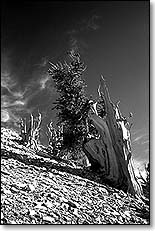i mentioned that the DC in our area featured a talk where the speaker, as an illustration of endurance, mentioned Methusaleh, the bristlecone pine that had lived for 4700+ years. i asked here for some possible explanations of this that allow for the WT flood dating. i had assumed that the standard response would be that the dating of the tree was wrong, that the rings had gotten doubled a few times or something. i dont think i received any further insight from anyone.
well, when time came for me to defend my disbelief, i mentioned this tree and its age as a problem for a literal genesis.
'what's the problem?' i was asked.
'well, that its 4770 some years old.'
'so, what's the problem? that it survived the flood.'
me, a little incredulous, 'uhhh yes. yes. are you suggesting that it lived underwater for a year?'
'why not?'
'because the rings show the relative climate for each year, the relative amount of sunlight and growth. living underwater with no sunlight for a year should leave a mark, not to mention the effect on climate in the succeeding years.'
'hmm... well i dont think the effect on climate would be all that great that it should be noticable. those trees can survive all kinds of things, even fire.'
well, so anyways this is the first ive heard the suggestion made seriously that all these trees lived happily underwater for a year with no signs of stunted growth. i dont want to look dogmatic. im sure that a tree _could_ survive underwater for some period of time but i dont know much more on the subject. can anyone (alanf maybe?) point me somewhere for further research?
thanks in advance.
mox
